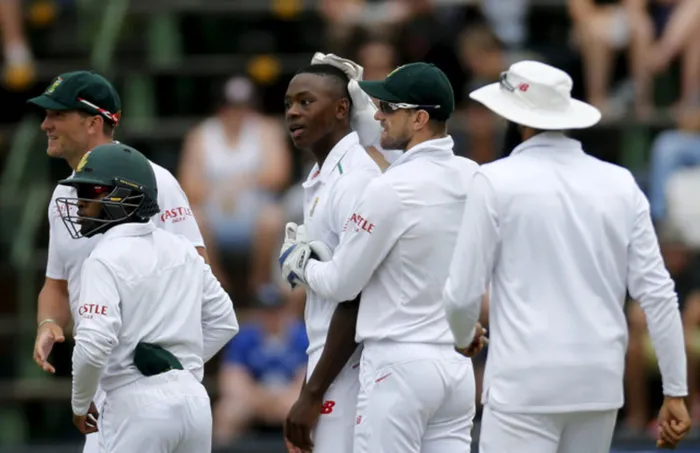
The face of hope: Despite the crushing series defeat against England, South Africa can at least take solace from Kagiso Rabada's performances. Rabada claimed his first five-wicket haul in Test cricket when he bagged 5/78 on Saturday. The face of hope: Despite the crushing series defeat against England, South Africa can at least take solace from Kagiso Rabada's performances. Rabada claimed his first five-wicket haul in Test cricket when he bagged 5/78 on Saturday.
Stuart Hess
Johannesburg: The temptation now is to dispense the baby with the bath water as far as the Proteas team is concerned, but that impulse must be fought.
It’s clear and concise thinking that is needed from South African cricket in the wake of a bitterly disappointing home series defeat to England. The standards by which we hold the current team and whoever else gets picked over the next 12 to 18 months needs to change.
The Proteas are no longer World No 1 and while new players become accustomed to the demands of international cricket, the team won’t play like the No 1 team either.
Along the way there needs to be some urgent structural changes, particularly to the coaching staff and possibly to the selection panel, too.
In defence of Russell Domingo, AB de Villiers and his predecessor as captain, Hashim Amla, it is worth noting that the current transition of the Test side has coincided with injuries to two major components of the group that became the world’s No 1 team.
More than at any other point in what has been an unsatisfying 12 months, the absence of Dale Steyn and Vernon Philander was felt at the Wanderers in the third Test. In those conditions, their experience and class would have made an enormous difference and perhaps the key period in the match – the half-hour before tea on day two when Ben Stokes and Joe Root rapidly transferred pressure back on to the home team – would have been different.
The Proteas’ inexperienced attack – which included three players with just eight caps between them – showed a lack of nous which was required in that period. They didn’t quickly enough heed the lessons that Stuart Broad did about bowling on that surface – for all the lovely pace and bounce, the dangerous ball was the one pitched up to the batsman which drew him forward, not the delivery that flew past his nose.
“I’m more consistent and that comes with experience,” said Broad. That latter quality was badly missed by South Africa in this series.
There is no other way to gain it other than to play, and the best way to learn is from the disappointments and mistakes – as Broad has done in his career, and in fact did at the Wanderers in the first innings, when he bowled too short. Hopefully those lessons can then be applied as the Proteas players’ careers unfold.
“They will learn a lot,” stated AB de Villiers. “Not that long ago I was that youngster in the team, going through ups and downs at Test level, personally and as a team, you learn a lot from that.
“At the moment it’s important just to survive and for a youngster to get through this and not to give up.
“If guys like Kagiso (Rabada), Hardus (Viljoen) and a few others get through this patch they’ll become much better cricketers.”
The current period is reminiscent of the last major upheaval that occurred with the Test side in 2004-05 – the previous time South Africa lost a home series against England, when De Villiers and Steyn made their debuts and Amla was playing only his second Test. Steyn and Amla were also dropped during that series.
De Villiers opened, was wicketkeeper and batted in the middle-order before going back to open again. It was chaotic, but in one crucial area South Africa had clarity – Graeme Smith was captain.
The kind of firm leadership he brought is missing right now as South Africa have utilised De Villiers and Amla as skippers this series. Regardless of the length of time both have been in the set-up, the position of captain has to be unequivocal.
That Amla fretted for two weeks about giving up the captaincy after returning from India should have been more carefully monitored, and that is poor management on his and the coaching staff’s part.
If he was not totally committed, it should have been recognised and a new captain installed before the series. The indecisiveness over the leadership has proven costly and there was a shambolic look about the side over the last week, from how the training sessions were run to how the last one-and-a-half days unfolded at the Wanderers.
Direction is needed and Domingo must be given better assistance. These are, and will continue to be, difficult times for the South African team, but the problems aren’t insurmountable; Rabada’s performances are clear enough evidence of that.